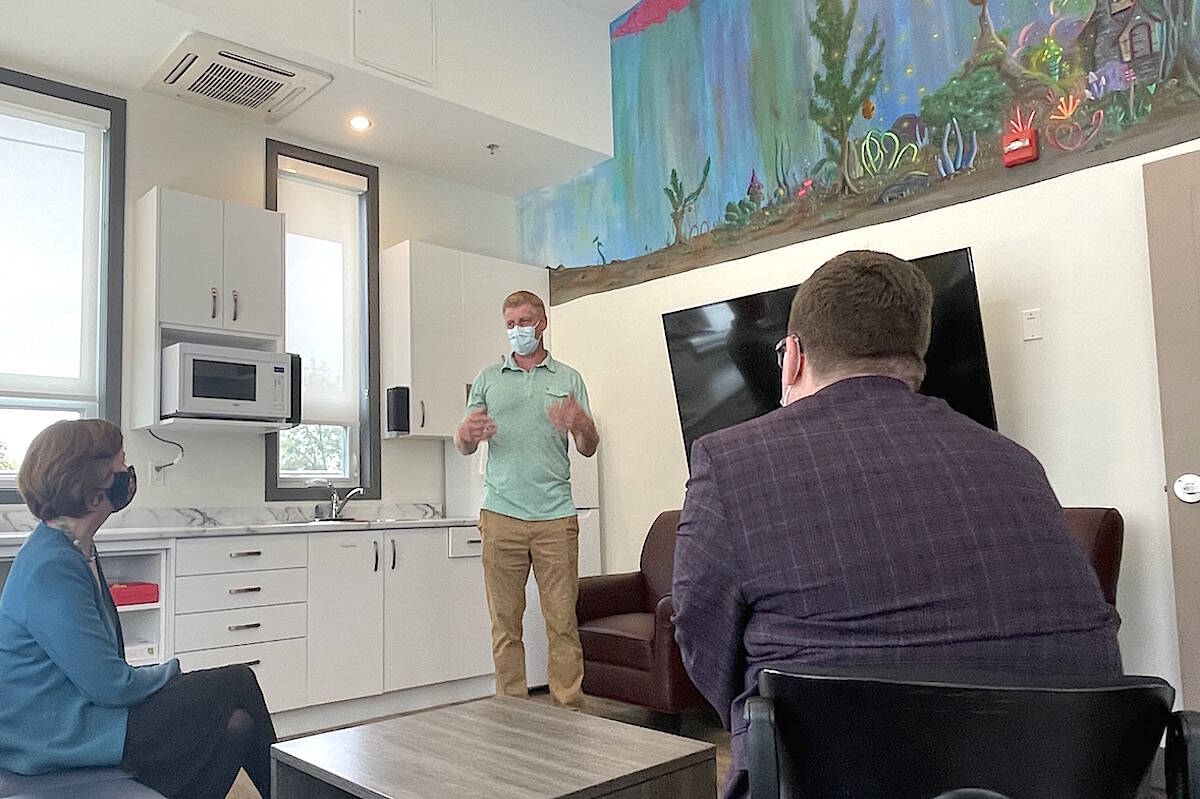The B.C. minister of mental health and addictions was encouraged and hopeful after a tour of the first residential youth treatment centre in B.C. with a built-in nature-based component.
Traverse is a 20-bed treatment facility in Chilliwack built next to the former Travelodge to serve youth aged 13 to 18.
“It’s so interesting to see this happening here,” said Sheila Malcolmson, minister of mental health and addictions, after getting a tour of the facility along with Chilliwack MLA Dan Coulter. The minister and other members of Premier John Horgan’s caucus were in Chilliwack for a three-day retreat, Sept. 22 to 24.
Seeing first-hand how addiction treatment can be delivered in a new way, has given the minister “hope,” she said, as well as ideas that can be implemented elsewhere in the province.
RELATED: Treatment centre for youth built in Chilliwack
It was opened last year by Fraser Health, built by B.C. Housing, and run by Pacific Community Resources Society (PCRS).
The centre has been providing team-based clinical care for youth with problematic substance use since last September.
“The work that we are doing across the province with Indigenous service providers and with First Nations Health Authority is really focused on land-based healing as a way to recover from addictions,” Malcolmson said. “And to see that idea being translated right here in Chilliwack, gives me hope.”
Enjoying the outdoors is “such an important part of how British Columbians experience our province,” the minister said.
“To see the strength of environment, and the strength of health-care delivery, coming together to help people with addictions, is very encouraging. This is a first and I am really glad to witness it,” Malcolmson said.
Residents at Traverse can stay up to six months while getting one-on-one counselling, recreation, and life-skills training in a highly structured program. The average stay is about two and half months.
“Traverse is one of the first of its kind because it’s one of the largest youth facilities that has both a clinical team but also an outdoor recreational component. So there’s outdoor therapy every single day,” said Steven Esau, director of operations, Fraser East, for PCRS.
There is a sports and recreation area on-site, with lush lawns, lots of greenery, as well as a sports court, walking circle, hammocks, and a large gazebo on its way. Every part of the facility’s infrastructure like the benches, face greenery.
“There are several thousand plants on-site, just for esthetic reasons but also for the calming effect of nature,” Esau added. “There was a lot of thought that went into every single part of this environment.”
Traverse residents are also transported to recreational areas like the Chilliwack Community Forest, or for a fire along the Chilliwack River to soak up some the positive effects of just being in nature. The outdoor adventures sometimes can qualify for physical education class time for youth trying to finish high school courses.
With an emphasis on nature-based treatment, young people gain insight into their relationship with nature and the healing it can provide, while working towards personal health goals.
Teen residents apply for the program from across the Fraser Health region, with treatment tailored to their specific needs.
RELATED: Open house held for youth treatment centre
PCRS, an organization with 35 years of experience providing high quality, accredited social services in B.C., has been contracted by Fraser Health to operate Traverse. PCRS has been working closely with Fraser Health mental health and substance-use team to support the unique needs of each patient.
The government provided $3.7 million to Fraser Health to support a combination of youth treatment beds and out-patient treatment services at the specialized treatment centre. BC Housing invested $5 million to buy the property and build the site. Fraser Health Authority will provide ongoing operational funding for the site.
Located at 45456 Yale Rd., the site was designed with ideas and feedback from youth and their families, who have struggled with substance use. Culturally safe programming for Traverse was developed with local Indigenous leaders, youth and communities, including cultural experiences and teachings.
Do you have something to add to this story, or something else we should report on? Email: jfeinberg@theprogress.com
@CHWKjournoLike us on Facebook and follow us on Twitter.

